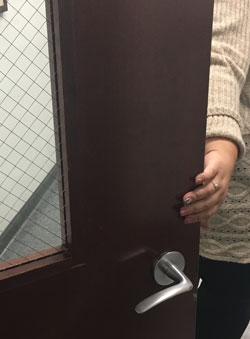We are all given a name at birth. Sherrill Rolland had to fight to get his name back. This is his journey. This is his remarkable story that I had the opportunity to witness and learn from, in more ways than one.
On Jan. 29, the University hosted a visit with Rolland, a man who spent ten months in prison for someone else’s mistake. Lies, trust issues, openness towards individuals, proximity issues, and new habits throughout a day-to-day basis were just some new obstacles Rolland has said he faced. I could not even imagine.
In 2013, Rolland was attending graduate classes when a warrant was set out for his arrest in Washington, D.C. Rolland explained that for nine months he fought to prove his innocence.
In late October, his trial was conducted and ultimately resulted in him being found guilty, incarcerating him for a year and thirty days. With good behavior he was released after ten months. He later asked for a retrial, and faced a new challenge ahead of him.
Now he has a record. A record that should have been someone else’s consequence. He now had to explain himself. Rolland said, “It is an experience I cannot depress or hide…I then accepted this way of my life, and these are the hurdles I will face with a record.”
Even after exonerating his name, being granted a bill of innocence, obstacles were still present.
We all have qualities and hobbies that we are passionate about. Being the expressive and independent person I am, I don’t even want to think about having that right taken away. Rolland’s passion was art.
Rolland said that being incarcerated restricted his value system. He felt as if he no longer had “a sense of safety on campus” and questioned if he ”should even be [t]here.”
Rolland chose to look at his campus as his previous year of life. He looked at the campus as the jail itself, the Art Building as his cell and the studio as his block. But most significantly, Rolland chose to wear his orange jumpsuit around campus. Feeding off of reactions, saying, “It’s just enough for people to question their space with me in it.”
We all have a voice, that is meant to be heard, right? Rolland no longer wanted his voice taken away.
He wanted to put the question out into the world of why, when a certain article of clothing is worn, reactions and opinions differ? He encouraged those involved, those around him, seeing him in the orange jumpsuit to take pictures and post. By giving himself back his name, rather than the “number he had become”, he had set out to make a change.
The idea of life being taken away, undeserved consequences being thrust upon a victim, is unimaginable. Rolland speaks of the way incarceration has changed his outlook on several aspects of life, in and out of prison. Regarding his cell mates and friends, he said, “I learned how to survive jail through them … I was judging them wrong.”
He explained they all have stories, just like the rest of us. And just like he said himself, “I did have the opportunity to never speak about this.” This opened my eyes to the ignorance of stereotypes so many still possess. Judgment is not necessary.
Rolland is aware that missed time cannot be repaid. It is evident that we don’t have time machines. That every mistake cannot just be fixed by an apology. But, he believes that he is never alone, and that God is always with him. I can relate to his view, similarly, when hardships are met, I believe the someone standing next to me, or watching over, even in the worst of times.
Rolland asked the audience many questions, which made individuals put themselves in his shoes. He ended the visit with saying, “We can come from the same neighborhood, but you wear the blue suit, and I wear the orange one.”
Out of the entire two hour visit, that line spoke volumes to me. The journey that this man was thrown into at such a young age is impossible not to sympathize with, but also incredibly inspired by. I yearn to make a remote change one day, compared to the one he has.


